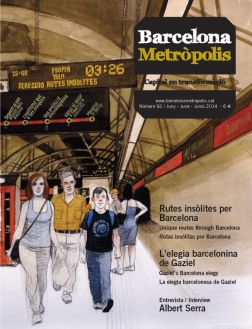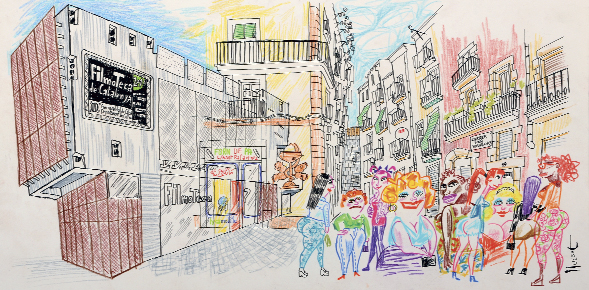They suggested we went to the Filmoteca. Raquel saw that they were showing a film starring Magnani, “which I’m sure you’ll really like, won’t you?”
“You see that building opposite, on the left, that’s the Filmoteca. And if you look to the right, you’ll see the Rambla del Raval, which we came down.” Our noses were squashed against the window panes, inside the hotel bar, from where we could see the adjacent square, the one that had been dedicated to Vázquez Montalbán. When I was young, I would go to Casa Leopoldo every week. At the weekends, my parents and I would visit the village and come back with a boat of vegetables, which on Mondays, on my way to school, I would have to take to the kitchen. I would go in, drop it off, they would give me some churros for breakfast and I was on my way; then my father would come and sort them out.
Today, whilst having lunch at home, Raquel insisted that I go back to the neighbourhood. “Leave him alone,” my son said to her. “It’s been at least forty years since he went there.” “Well, that’s why he should go back,” she replied. And since it had indeed been forty years since I went there, and Raquel is so kind and my son is so happy with her and sometimes so disappointed, it seems, with me, I decided to go, that we should all three go there for a stroll. And here we are, with our noses pressed up against the window. And it’s been a while since I stopped listening to Raquel pointing things out, because I’ve been thinking about whether what we are doing is more like being hidden away or locked up. “Dad, we’re going to go up to the terrace. There are great views of the neighbourhood from there,” my son told me, pulling me backwards by the arm. So we went up. And “look down here: to the left is the Filmoteca and to the right, the Rambla del Raval,” Raquel said again. And this time I started thinking about whether we were now spies or whether we were on lookout: inside, but far from everything anyway, once again. And again I didn’t make up my mind because then my son said we had to go back down again.
On our way here in the car they suggested we went to the Filmoteca, that building over there, on the left. Raquel took out her mobile phone and saw that they were showing a film starring Magnani, “which I’m sure you’ll really like, won’t you?” she asked me. I told her that I would but that we didn’t need to complicate matters, that we could just go to have a look around. “Don’t be such a bore, dad,” my son said. “Look, it starts in three quarters of an hour; that gives us enough time to see the Rambla del Raval and go to the hotel.” Raquel, mobile in hand, had got it all worked out. And now that we’re crossing the square, I can see that the street over there is Calle En Robador and a little farther down is Sant Pau and there in front, Sant Ramon. And everything is starting to feel a bit more familiar when Raquel pulls me by the arm, whilst smiling uncomfortably and says: “Yeah, they’re always there, on the corners.” She pulls me rather forcefully and opens the door to the hall. We go into the film theatre and on the screen I see a dishevelled Magnani, looking great; and I see the balconies with the clothes hung up to dry and narrow streets and winding stairways and loose paving stones and old men in the street and neighbours at loggerheads and children running about and shady deals being carried out on street corners and pimps and whores and drama and life.
On our way back in the car, Raquel spends the whole time talking about the film; about cinéma vérité and about how harsh it makes everything seem, what extreme characters they portray and, think about it, if Rome really was like that, how different it is from the city they saw last summer, with its museums and restaurants and hotels.
“Magnani’s Rome is really beautiful,” I say.
“You are such a nostalgic person, dad,” says my son, manoeuvring the car ready to park.




